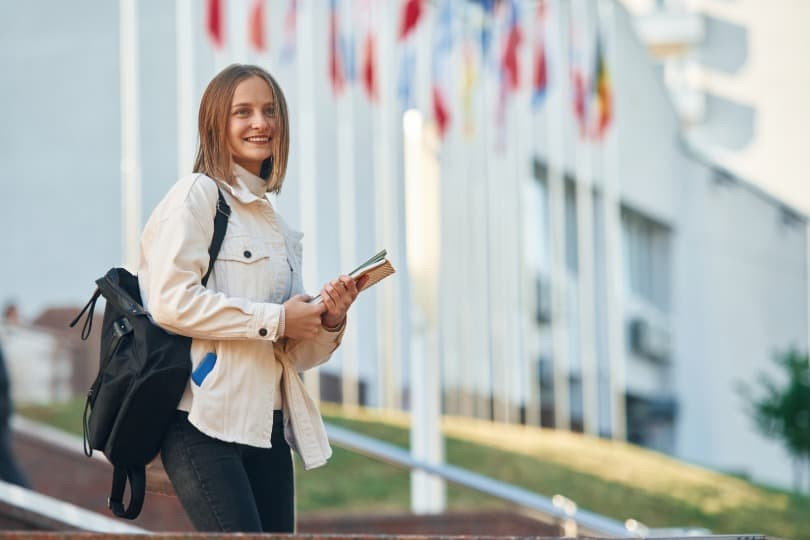More than a quarter of Czech university students are not studying at their first-choice school. This is most common among students of education and economics faculties. Every fifth student says that the expectations with which they came to the school were not met. The greatest disillusionment in this regard is found in humanities faculties. On the other hand, students of social sciences, law, and mathematical-physical faculties are the most satisfied with their schools. However, students across all fields agree on their opposition to tuition fees. Three out of four students reject them, and they would not be much swayed even by a possible offer of scholarships. This emerged from an extensive survey among 1,125 students of Czech universities across the whole country. The survey was prepared by GTS Alive, which among other things issues and manages ISIC student cards.
“In the survey, we also asked students what they find most positive about their school and what they see critically. They praised the quality of their teachers the most. Most of them evaluate their teachers as excellent experts and appreciate their approachable attitude,” commented Radek Schich, director of GTS Alive, on the results.
"As for the negatives, students often criticized the insufficient connection between study and practice. They also mentioned that frontal teaching still persists in some places, where the teacher does not engage them at all and they only have to passively listen to his lecture. The problem is apparently also the insufficient quality of dormitories, which according to students in some places do not correspond to the prestige of the given universities," added Radek Schich.
According to students, the highest quality teachers are generally at the faculties of mathematics and physics, natural sciences, social sciences, law, and medicine. From this perspective, pedagogical faculties fare the worst.
It is difficult to get into medical faculties and to succeed there.
And how difficult was it to get into the individual fields? "Very difficult" is most often rated by today’s students of medical and pharmaceutical faculties. The easiest path, according to them, leads to technical, economic, natural sciences, or chemistry faculties.
Another question, however, is the difficulty of the studies themselves. "Rather easy" is most often rated by students of pedagogical and social sciences faculties. On the other hand, "very difficult" was often stated by medical faculty students (up to two-thirds of them), followed far behind by students from technical and mathematical-physical faculties (one-third of them).
Future teachers do not want to leave the field
The survey also revealed interesting conclusions about young people’s plans to stay in their field after graduation. Contrary to the generally held belief, current students of pedagogical faculties are not very willing to leave their field. Over eighty percent of them really want to start teaching. Most students of medical, mathematical-physical, or law faculties also want to stay in their field. On the other hand, “rabbit intentions” (plans to leave) most often appear among university students from humanities faculties.
About half of the students currently feel sufficiently motivated to study. About one in four students report low motivation. However, on agricultural, pedagogical, and humanities faculties, it is worse—there, every third student is demotivated. The greatest current motivation to study is felt by future lawyers, followed by students of social sciences and medical faculties.
The good news is that only about seven percent of students think they will leave their current university prematurely. The main reason is that they are bored by their studies or find them too difficult.
Half of the students are not planning to go abroad
Students were also asked about studying abroad in the survey. Every tenth student has already studied abroad, and another third plans to do so. However, a full half of the students do not plan to go abroad at all.
Among students with foreign experience, about a third say the foreign school was better, a third prefer their Czech school, and a third rate both equally. The first group appreciates, for example, a more individualized approach, more interaction, more practical teaching compared to theory, better quality of teaching and facilities, better organization, significantly higher scholarships, or higher quality research at the foreign university.
The survey was conducted among students of all Czech universities in March and April 2023.
Notes for editors:
The company GTS Alive s.r.o. issues and manages student cards ISIC and pupil cards ISIC Školák (ISIC Scholar), teacher cards ITIC, and occasionally other cards in the Czech Republic. The company was established in August 2000. Its predecessor in the Czech Republic was GTS International. GTS Alive s.r.o. is part of the international group GTS Alive Group, headquartered in Prague, with branches in seventeen countries across four continents.
Through the chip identification system ISIC PORT, GTS Alive also provides a number of primary and secondary schools with access security to their buildings and an electronic attendance system. The company also mediates travel or accident insurance for students, among other services.
For more information contact:
- Jan Šimral, media representative of GTS Alive
- Phone: +420 737 944 370
- E-mail: info@jansimral.com






